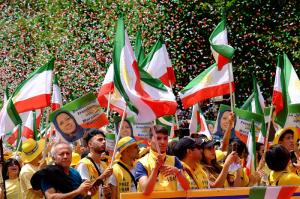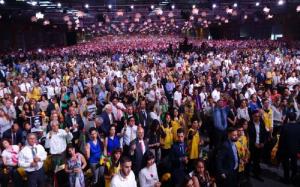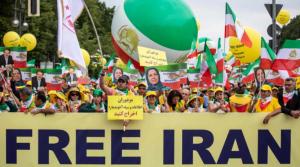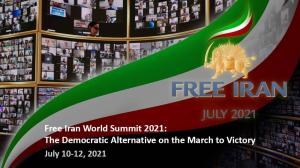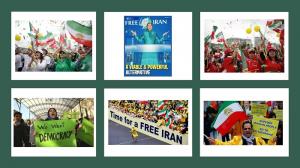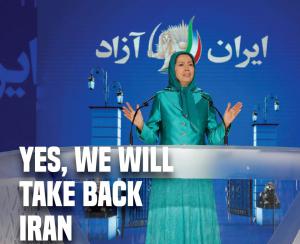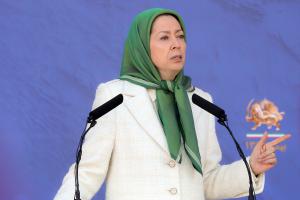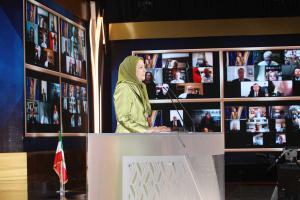The November 2019 uprising confirmed the PMOI’s staying power and the role of the Resistance Units, supporters of the MEK/PMOI to overthrow the regime.
The clerical regime’s strategy will be discussed in greater detail for a broad international audience between July 10 and 12, when Iranian expatriates, hosts their Free Iran World Summit.”
PARIS, FRANCE, July 1, 2021 /EINPresswire.com/ -- In May, a report from United Nations Secretary-General Antonio Guterres brought renewed attention to the abysmal situation of human rights in Iran. The report referred to the lack of accountability for a severe crackdown on peaceful protests in November 2019 as “emblematic” of this issue, and noted that “protesters, human rights defenders, lawyers, and civil society actors continue to be subject to intimidation, arbitrary detention and criminal prosecution, including the death penalty.”— NCRI
These threats stand to grow even worse in the months ahead. Since Guterres issued his report, the Iranian regime strongly reinforced its lack of accountability by designating one of the main overseers of the 2019 crackdown as the mullahs’ next president. At the time of the crackdown, Ebrahim Raisi had at the head of the regime’s judiciary for about eight months, having been assigned to that position by the regime’s Supreme Leader Ali Khamenei. His selection is part of an effort by Khamenei to consolidate power and to institutionalize a brutal emerging response to the growth of organized opposition to the theocratic dictatorship.
Violent repression of dissent is a perennial feature of the Iranian regime, but it took on a new sense of urgency for hardline authorities at the beginning of 2018 when more than 100 cities and towns were participating in a nationwide uprising. In the midst of that unrest, Khamenei delivered a speech in which he acknowledged that the scale of the uprising and the slogans like “death to the dictator” were attributable to the organizing efforts of the People’s Mojahedin Organization of Iran (PMOI/MEK).
MEK is the principal challenge to the mullahs’ hold on power since the earliest years of the regime. In 1988, Ruhollah Khomeini initiated a push to stamp out the MEK and other organized opposition groups by declaring them to be enemies of God and directing the judiciary and the Intelligence Ministry to eliminate them through a campaign of mass executions. In the summer of that year, “death commissions” all across Iran interrogated political prisoners and commanded them to disavow their prior affiliations and since the prisoners refused, the death commission sentenced them to death by hanging or firing squad.
More than 30,000 political prisoners were eliminated in this way. The 2018 uprising debunked the regime’s allegation of the MEK being completely eliminated, and since then the regime has not gone back to its prior talking points ever since. The November 2019 uprising confirmed the PMOI’s staying power and the role of the Resistance Units, supporters of the MEK/PMOI to overthrow the regime.
Thus, regime authorities responded with immediate panic to the outbreak of the second nationwide protest movement, which erupted simultaneously across almost 200 localities. The Islamic Revolutionary Guard Corps promptly opened fire on crowds in a number of cities, killing more than 1,500 people in a matter of days. The subsequent “intimidation” that Guterres referred to in his report was manifested in the mass arrest of 12,000 known and suspected activists, many of whom were tortured over a period of several months in an effort to elicit false confessions and lay the groundwork for prosecutions on national security charges, including charges that carry the death sentence.
Raisi’s role in this crackdown reaffirmed the legacy he had developed for himself as one of the key figures in the death commission during the 1988 massacre. As a matter of fact, this legacy is the very thing that prompted Khamenei to appoint Raisi as judiciary chief and then clear the way for him to run a virtually uncontested campaign for president.
Such assessments of the regime’s strategy will be repeated in greater detail for a broad international audience between July 10 and 12, when Iranian expatriates, hosts their Free Iran World Summit. This year’s event will be comprised of gatherings of Iranian expatriates in countries all across the world and will feature speeches from American and European policymakers who are keen to elaborate upon the UN Secretary General’s warning about a lack of accountability and a culture of impunity inside the Iranian regime.
As the summit will surely make clear, that impunity stands to be reinforced more thoroughly than ever before if the international community fails to bring adequate attention to Raisi’s history of human rights abuses, or adequate pressure to the regime that viewed those abuses as qualifications for the Islamic jurist’s presidential bid. The summit will also underscore the fact that Raisi’s promotion in no way reflects the will of the Iranian people, who overwhelmingly chose to participate in an electoral boycott rather than provide the theocratic regime with any sense of political legitimacy.
In the run-up to the June 18 election, the National Council of Resistance of Iran (NCRI) predicted that the success of this boycott would set the stage for further popular unrest, which the coalition’s Foreign Affairs Committee Chairman Mohammad Mohaddessin said would be “much more intense and widespread than in previous years.” The Free Iran World Summit can be expected to highlight all evidence for this outcome that already exists or may emerge in the coming weeks. The international community should pay close attention to that message and carefully apply it to their decisions regarding Iran’s policy in the era of Raisi.
Within the halls of power of the regime, there is no doubt that that era will be defined by a continued lack of accountability. But on the international stage, measures such as economic sanctions, diplomatic isolation, and legal investigations may serve to demand real accountability for the regime and its leading officials, as well as signaling support for an opposition movement that is to mount a serious challenge to a government now led by one of the figures most responsible for their compatriots’ past suffering.
Shahin Gobadi
NCRI
+33 6 50 11 98 48
email us here
Visit us on social media:
Facebook
Twitter
Call for Supporting Iran’s People and Opposition Against the Religious Fascism

